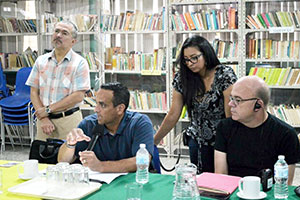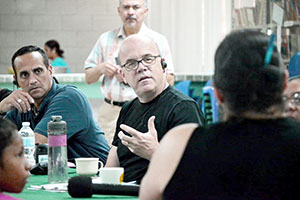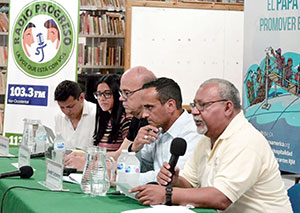
Mayor Joseph Curtatone traveled with a delegation to Honduras to learn about the country’s living conditions.
By Shira Laucharoen
Mayor Joseph Curtatone embarked on a trip to Central America as part of a fact-finding mission, with the purpose of learning about living conditions and gathering information that will help protect immigrant rights in the United States.
Curtatone, who traveled with U.S. Congressman Jim McGovern and representatives from human rights groups, aims to combat President Donald Trump’s plan to end Temporary Protected Status (TPS) for immigrants from Central America.
The delegation visited the countries of Honduras and El Salvador, while Curtatone only traveled to Honduras, from August 12 to 15. The politicians were accompanied by representation from advocacy and legal organizations Alianza Americas, Centro Presente, and the Lawyers’ Committee for Civil Rights and Economic Justice.
In Honduras, stops included the capital city of Tegucigalpa, as well as El Progreso. The visitors hoped to gain first-hand knowledge of the quality of life in Honduras, as TPS is a program that temporarily prevents immigrants from being deported from the U.S. if their countries of origin are determined to be unsafe. Trump announced his intention earlier this year of terminating TPS for immigrants from Honduras and El Salvador, stating that conditions there have improved. Curtatone and the delegation undertook the trip to prove that this assertion contradicts the countries’ realities.

The delegation, which included Curtatone and U.S. Congressman Jim McGovern, aims to support Central Americans seeking asylum in the United States.
“The people were some of the most hardworking, compassionate, warm people I have ever met in my life, but the situation underground is dire,” said Curtatone. “Hoduras is a dangerous place. The government is rife with corruption. Violence is prevalent when you walk out into the street. Poverty is rampant. People are not coming to our country to us, they’re fleeing. They’re just trying to survive. It’s not an immigration problem, it’s a humanitarian crisis.”
While in Honduras, the delegation spoke with U.S. Ambassador to Honduras Chargé Heide Fulton, director of the radio station Radio Progreso Father Ismael Moreno “Padre Melo,” and families that have been affected by immigration laws. Curtatone described the stories as “horrific and heartbreaking,” as he met with individuals who had been separated from their loved ones at national borders or whose sons had disappeared during the immigration process.
The delegation asked to speak with the President of Honduras, but the request was denied. Executive director of Centro Presente Patricia Montes said that violence against women and children remains a significant problem in Honduras, stating that gang violence and extreme poverty are the chief reasons why individuals leave the country.
“If people knew the facts of what’s happening in Honduras and El Salvador, they would find our policies to be a direct contradiction of our values of being a diverse, tolerant, civil, compassionate, and humane society,” said Curtatone.
TPS was established by Congress as part of the Immigration Act of 1990, granting immigrants temporary protection from deportation if their home countries are experiencing armed conflict or natural disasters.
The program, overseen by the Department of Homeland Security, offers people temporary status in 6 – 18 month intervals, which can be renewed for as long as the crises persist. Honduras became a designated country in 1999, following a hurricane, while El Salvador became a part of the program in 2001, in the aftermath of two earthquakes. According to the Somerville Mayor’s Office, there are approximately 7,000 TPS holders from Honduras and El Salvador living in Massachusetts. Trump announced this year that TPS would terminate for Salvadorans living in the U.S. in September 2019, while he also stated that TPS would end for Hondurans in January 2020.
The Somerville Mayor’s Office said that the city has and will continue to take action to protect immigrants from Central America, in the wake of this news. Somerville is one of

Curtatone spoke as part of a panel at Honduras’ Radio Progreso. ~ Photos courtesy of Radio Progreso
several Massachusetts communities that has signed onto a lawsuit against the Trump administration, challenging the termination of TPS for immigrants from Haiti, El Salvador, and Honduras. The case, which was initially filed in February 2018, was brought by the Lawyers’ Committee for Civil Rights and Economic Justice and the law firm of Choate, Hall & Stewart, LLP.
The City of Somerville has also established a Sanctuary City working group, which will provide legal resources for those “eligible to find a path to adjust their immigration status or apply for citizenship,” according to the Somerville Mayor’s Office.
Meanwhile, organizations like Centro Presente, which represents over 1,000 immigrants from Honduras and El Salvador, will educate policy members on the local and state level about the impact the termination will have, said Montes. In Somerville, Centro Presente has organized “legal clinics,” where attorneys give their free time to advise immigrants looking for support.
“It is extremely important to educate policy makers and society in general about what are the main factors pushing people to come without documents to the United States, especially from Central America,” said Montes. “Most families being separated are from Honduras, Guatemala, or El Salvador. It is important for people to understand that the situation is very complex.”













This article sheds light on how with an active agenda and firm voice politicians can advocate to stop immigrant injustices perpetuated by the Trump administration. What Mayor Curtatone, Congressman McGovern and the human rights delegation undertook was no small matter. Stimulating article.
And yet many of these Central American immigrants are being driven out of their homes in Somerville by the same real estate lobby and professional house-flippers that pour hundreds of thousands of dollars into the Mayor’s political war chest. Nice of him to make the trip, but he didn’t have to fly to Tegucigalpa to see injustice against these people, he could have just had his driver take him down Pearl Street.